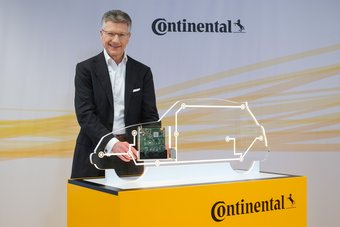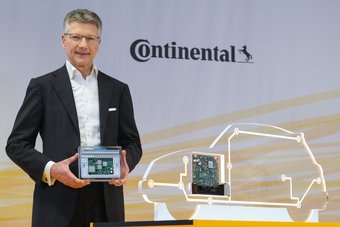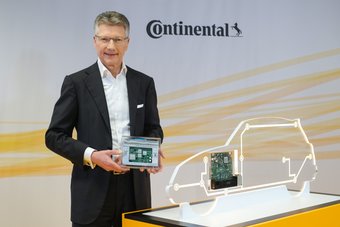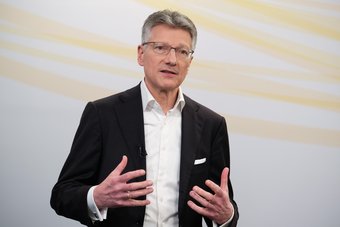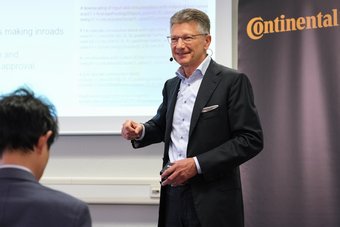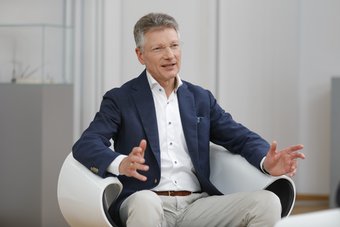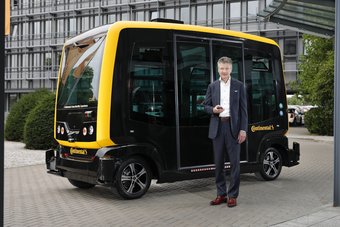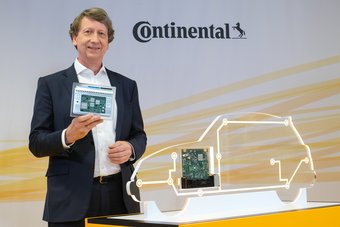Third Quarter: Slight Recovery as Highly Volatile Market Environment Continues
- Consolidated sales of €10.3 billion (Q3 2019: €11.1 billion)
- Adjusted EBIT of €832 million (Q3 2019: €612 million); adjusted EBIT margin of 8.1 percent (Q3 2019: 5.6 percent)
- EBIT of -€673 million in third quarter (Q3 2019: -€1,971 million) and net income of -€719 million, resulting from impairments and expenses as already announced (Q3 2019: -€1,986 million)
- Free cash flow before acquisitions and carve-out effects: €1.8 billion (Q3 2019: €343 million)
- CEO Dr. Elmar Degenhart: “From an operational standpoint, we did remarkably well in the third quarter. We are confident that, for the year as a whole, we will achieve a positive free cash flow before acquisitions and carve-out effects.”
- Outlook for fiscal 2020: consolidated sales of about €37.5 billion; adjusted EBIT margin of about 3 percent; positive free cash flow before acquisitions and carve-out effects
- Multi-billion-euro volume orders for future technologies such as integrated brake systems and high-voltage box for electric vehicles
Hanover, November 11, 2020. In a continuing highly volatile market environment, Continental achieved overall solid quarterly results in the third quarter of 2020. As was expected, from an operational standpoint, the quarter developed better than the historically weak second quarter of 2020. Consolidated sales in the third quarter amounted to €10.3 billion (Q3 2019: €11.1 billion). Before changes in the scope of consolidation and exchange-rate effects, sales were down 2.7 percent compared to the same period of 2019. In the second quarter of 2020, they were down by as much as 40 percent. The adjusted operating result (adjusted EBIT) in the third quarter rose to €832 million compared to the previous year (Q3 2019: €612 million), corresponding to an adjusted EBIT margin of 8.1 percent (Q3 2019: 5.6 percent).
“We did remarkably well in the third quarter from an operational standpoint. The measures we undertook as soon as the coronavirus pandemic broke out were fully effective. We thus did not hesitate to hit the brakes immediately. In China and North America, we were just as resolute in accelerating again when the markets started to recover. Our enhanced agility and our disciplined cost management make us more competitive worldwide. In a persistently tough market environment, we are thus demonstrating a more-than-satisfactory performance on which we can build. It gives us reason to look to the future with optimism, yet with a certain degree of caution. We are confident that, for the year as a whole, we will achieve a positive free cash flow before acquisitions and carve-out effects,” said Continental CEO Dr. Elmar Degenhart, when announcing the quarterly figures on Wednesday in Hanover.
He added: “The current development should not, however, fool us into thinking that the global automotive markets will recover quickly. They are still in the midst of a fundamental technological transformation. And with the number of coronavirus cases on the rise once again, the markets continue to be unpredictable. The overall critical situation clearly confirms that, above all, resolute and flexible action is needed to safeguard our competitiveness and viability. That is the goal of our structural program as well as our realignment and strategy. With the decisions made recently by the Executive Board and Supervisory Board, we have passed a key milestone and are now increasingly looking ahead to our profitable growth with future technologies.”
Market development driven by North America and China; Europe continues to be weak
Market development in the third quarter was better than expected, particularly in China
(6.3 million units; +10.7 percent) and in North America (4.0 million units; +0.5 percent). Production of passenger cars and light commercial vehicles in Europe (4.2 million units; -8.0 percent)
– especially in Germany (0.9 million units; -16.1 percent) – has not yet recovered and is substantially below the previous year’s level. According to preliminary figures, global production of passenger cars and light commercial vehicles was down about 3.5 percent to 20.3 million units in the third quarter (Q3 2019: 21.0 million units).
Impairments and restructuring provisions impact reported results
As explained in the mandatory disclosure issued on October 21, 2020, the market assumptions made and adapted as part of the annual planning process led to the recognition of non-cash impairments of goodwill totaling €649 million in the Vehicle Networking and Information business area in the third quarter of 2020. The largest portion of the impairments was attributable to acquisitions made before fiscal 2008. The expected impact of restructuring measures was also taken into account in the planning process.
Additionally, in the third quarter of 2020 there were restructuring expenses and impairments on property, plant and equipment totaling €687 million, which were incurred as part of the expanded Transformation 2019–2029 structural program. For the fourth quarter, further restructuring expenses and impairments of an undetermined amount on property, plant and equipment are expected in conjunction with this program.
These impairments and restructuring expenses led to a negative reported EBIT in the third quarter of 2020, as is also the case for the net income attributable to the shareholders of the parent. The operating result (EBIT) in the third quarter of 2020 amounted to -€673 million (Q3 2019: -€1,971 million), corresponding to an EBIT margin of -6.5 percent (Q3 2019: -17.7 percent). Net income totaled -€719 million (Q3 2019: -€1,986 million).
Strong free cash flow before acquisitions and carve-out effects
In the third quarter of 2020, free cash flow before acquisitions and carve-out effects amounted to €1.8 billion (Q3 2019: €343 million). In the second quarter of 2020, it was negative, at -€1.8 billion. “As expected, the negative working-capital effects from the second quarter were neutralized with the stabilization of the business trend in the third quarter,” explained Continental CFO Wolfgang Schäfer.
Outlook for fiscal 2020
For the fourth quarter of 2020, Continental anticipates that global production of passenger cars and light commercial vehicles will be down 4 to 6 percent year-on-year. For 2020 as a whole, the company is forecasting a decrease of about 18 to 19 percent. Based on these production expectations and the forecasts for the development of the replacement-tire markets, and assuming in particular no new, unexpected impacts from the ongoing coronavirus pandemic on production, the supply chain or demand, Continental currently expects consolidated sales of around €37.5 billion and an adjusted EBIT margin of around 3 percent for fiscal 2020.
For the automotive business areas Autonomous Mobility and Safety, Vehicle Networking and Information, as well as Powertrain, the technology company anticipates sales of around €22.0 billion and an adjusted EBIT margin of around -1.5 percent. This outlook includes, among other factors, expected provisions for warranty claims and higher than expected net research and development expenses. These factors will noticeably impact adjusted EBIT in the fourth quarter of 2020.
For its Rubber business areas, Continental expects sales of around €15.5 billion and an adjusted EBIT margin of around 10.5 percent for fiscal 2020.
Further expenses for restructuring and asset impairments related to the Transformation 2019−2029 program are expected to be recognized in the fourth quarter of 2020, though the amounts are not clarified at this time. Though these effects will not affect adjusted EBIT, they will materially impact reported EBIT and net income attributable to shareholders.
The capital expenditure ratio before financial investments is expected to be around 6.3 percent of sales.
Free cash flow before acquisitions and before carve-out effects is expected to be positive for fiscal 2020. However, the value is expected to be significantly lower than in the previous year.
Development of the group sectors
Sales in the Automotive Technologies group sector amounted to €4.1 billion (Q3 2019: €4.7 billion), and the adjusted EBIT margin was 2.4 percent (Q3 2019: 5.0 percent). Organic sales growth came to -6.4 percent.
In its Automotive Technologies group sector, Continental was able in the third quarter of 2020 to land multi-billion-euro orders for future technologies such as for an integrated brake system at a premium German manufacturer. The new ID.3 electric model from Volkswagen is already on the road – safe and connected with Continental technology.
The technology company supplies key components for the model such as a particularly robust and low-maintenance drum brake, energy-efficient tires, hose lines for the thermal management system, the central display, and a fully connected central high-performance computer, which is the central link between the vehicle and the digital world. Continental has already received orders from vehicle manufacturers worldwide totaling more than €4 billion for these high-performance vehicle computers.
The Rubber Technologies group sector achieved sales of €4.3 billion (Q3 2019: €4.6 billion) and an adjusted EBIT margin of 15.0 percent (Q3 2019: 11.8 percent). Organic sales growth came to
-1.4 percent. The positive margin development in the third quarter of 2020 was primarily a result of higher cost discipline, the trend in raw-material costs as well as solid sales figures in China and North America. Sales figures in Europe continued to be below the previous year’s level. Furthermore, the tire industry anticipates that the winter-tire business will be weak in Europe.
In the ContiTech business area, the structural measures that have been undertaken since 2018 as well as the high cost discipline are having the planned effect with regard to earnings. With an adjusted EBIT margin of 10.6 percent in the third quarter of 2020 (Q3 2019: 7.5 percent), the business area achieved the double-digit margin target corridor. In the third quarter of 2020, ContiTech experienced regulation-driven demand in China particularly for its truck air springs. The tailwind from raw-material prices and substantially reduced expenses will not, however, be a lasting effect, so the margin level that was achieved in the Rubber Technologies group sector will not be sustainable.
In the Powertrain Technologies group sector, sales amounted to €1.9 billion (Q3 2019: €1.9 billion) and the adjusted EBIT margin was 5.8 percent (Q3 2019: -6.5 percent). Organic sales growth came to 2.4 percent. Vitesco Technologies profited from higher call-offs of electrification components, in addition to higher sales with electronics for drive systems and sensors. This positive trend is also reflected in the order intake. As an example, in the third quarter the business area received a multi-billion-euro order for a fully integrated high-voltage box for electric vehicles. This box serves as a kind of substation in an electric vehicle and combines several functions (e.g. controlling the charging process and ensuring the energy supply) and is also designed for operating voltages of up to 800 volts.
As at the end of the third quarter of 2020, Continental had more than 233,000 employees. representing a decline of more than 7,700 in comparison to the end of 2019. The reasons for the decrease are low production volumes due to the coronavirus pandemic, improvements in efficiency, and measures taken as part of the structural program.
Please finde here an overview of all available materials relating to the publication nine months 2020 results.
Dr. Elmar Degenhart
Dr. Elmar Degenhart, Chairman of the Executive Board Continental AG
Wolfgang Schäfer
Member of the Executive Board, Finance, Controlling, Compliance, Law, and IT, CFO






